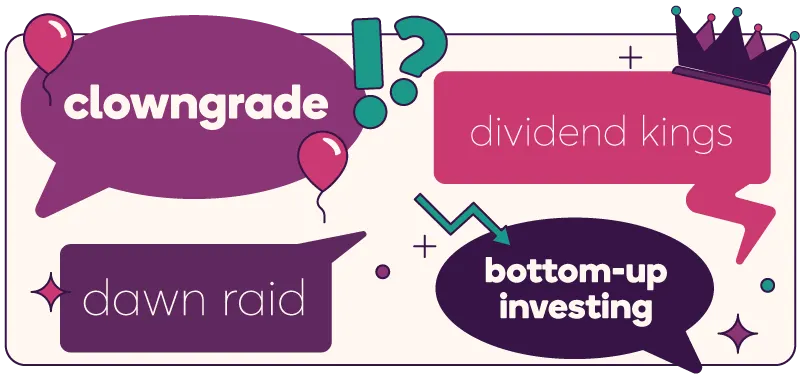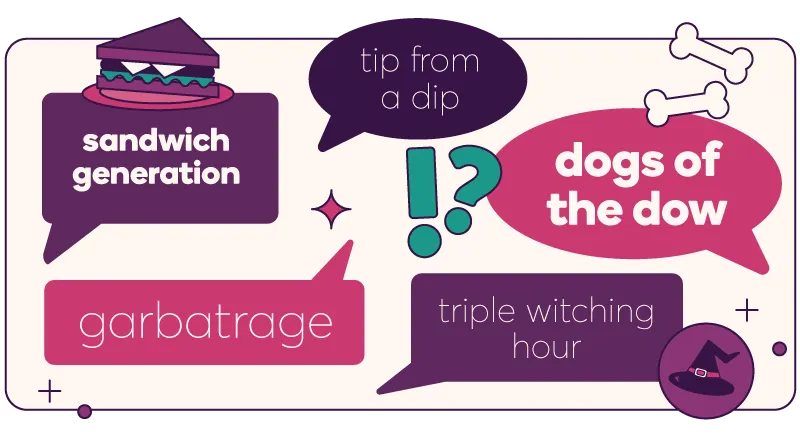What we'll cover
Strange investing terms and what they mean
Why you shouldn't let complicated investing terms intimidate you
Why it is beneficial to know your way around these terms
From baseball’s food-themed pickle and rhubarb to photography’s Uncle Bob and Shutter Nutters, seemingly every industry has insider vocabulary. If you’re thinking about investing in the market, you might’ve come across some odd investing terminology. But don’t let it act as a roadblock to building wealth. Deciphering stock market lingo isn’t remotely as tough as, say, cracking the code on the Rosetta Stone. (Although we will admit, some of these terms are a little out there …)
1. Ankle biter
No, it’s not a small child. Instead, it’s investing in a small cap stock (meaning a company valued between $300 million and $2 billion).
2. Bear hug
A form of financial PDA: A bear hug happens when a company offers to acquire another business’s shares for more than what they're worth to convince management to sell.
3. Big uglies
A term used to describe larger, older companies in what some consider to be “dirty” industries (think: mining, steel production or oil).
4. Bottom-up investing
When you look at a company's fundamentals to decide whether to invest. Your focus is on what makes a company financially sound versus how it might be affected by macroeconomic trends or market cycles.
5. Candlestick
A type of chart showing the high, low, opening and closing prices for a security over a set time period. Illuminating!

6. Clowngrade
You never want your portfolio to feel like a circus. A clowngrade refers to an investment analyst making a seemingly foolish upgrade or downgrade.
7. Cockroach theory
You might’ve heard the phrase: For every cockroach you see, there’s 100 more you don’t. Cockroach theory applies that thinking to the world of investing — when a piece of bad news relating to the markets is released to the public, there’s likely more lurking in the wings.
8. Crown jewels
A company’s most valuable, prized assets. (So, similar to when you’re talking about the Royals.)
9. Dawn raid
The early bird gets the worm, at least in this situation. A dawn raid is when a significant number of a company’s shares are purchased at the start of the trading day.
10. Dead cat bounce
One of the more gruesome investing terms, this refers to a short-lived rally after an extended downward trend in the markets. Because, you know, things bounce when they hit the ground…?
11. Dividend kings
Stocks that have an extraordinarily long track record of paying increasing dividends to investors. To receive this designation, the payout must increase for at least 50 consecutive years.
12. Dogs of the Dow
If you want to take a conservative approach to investing in stocks, stick with dogs of the Dow — companies that are the 10 highest dividend-yielding stocks from the Dow Jones Industrial Average.
13. Efficient frontier
Highly diversified portfolios that offer the highest returns based on a specific degree of risk.
14. Field bet
A high-risk strategy that involves buying stocks in several companies that belong to a declining industry. You assume one or more of those companies will go bankrupt, then reorganize and become financially stronger.

15. Garbatrage
When stock prices or trading activity is influenced by rumor or herd psychology (like when there’s a takeover involving two major companies in the same sector).
16. Pattern day trader
These investors make four or more day trades over five business days using a margin account. Being flagged as a pattern day trader can restrict your ability to trade.
17. Poison pill
While not strictly an investing term, this defense tactic is of particular interest to a company’s shareholders. A poison pill allows shareholders to purchase discounted shares in the company to defend against an unwelcome takeover by diluting the ownership value.
18. Puke point
Investing slang for the moment when you sell a losing security to avoid further losses.
19. Sandwich generation
The generation of people who are caught financially between caring for aging parents and raising kids.
20. Scalping
A trading strategy involving the buying and selling of securities frequently to capitalize on shifting price movements.
21. Tip from a dip
When you get an investing tip from someone who claims to have insider knowledge but really doesn’t have a clue.
22. Triple witching hour
A trifecta of events relating to a stock: the expiration of stock options, stock index futures and stock index option contracts on the same day.
23. Valium picnic
When trading activity on a given day is slow or grinds to a halt altogether because the markets are closed.
Put your knowledge of stock market lingo to work.
Now that you’re familiar with some of the strangest financial terms out there, you might feel empowered to put some of them to use in your own investment portfolio. Or put your friends’ know-how to the test by quizzing them with this vocab!



